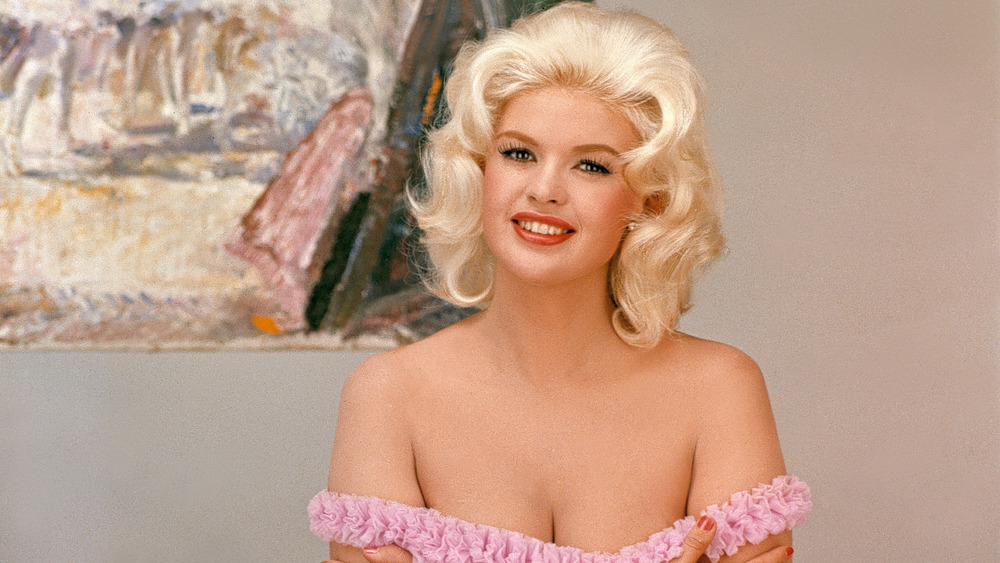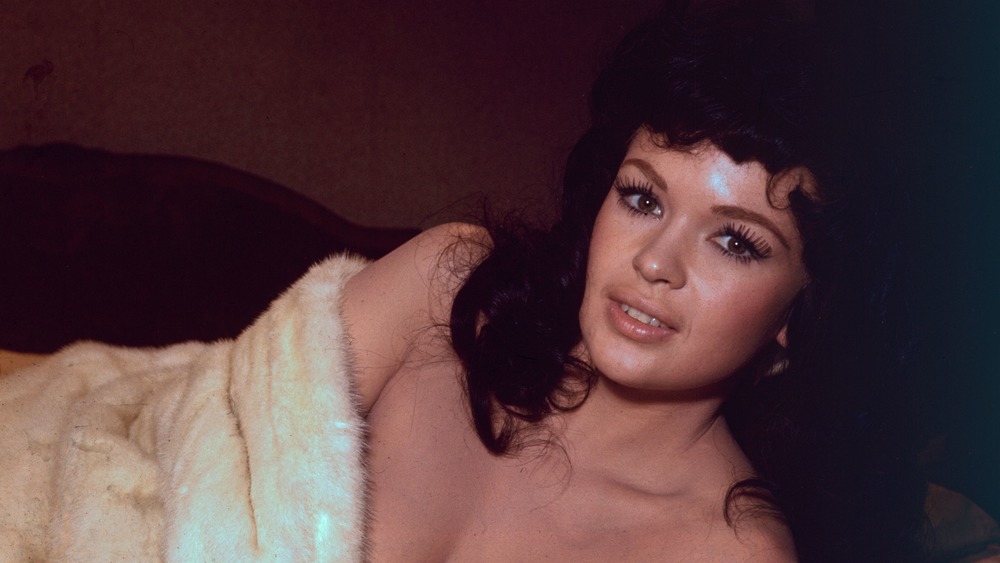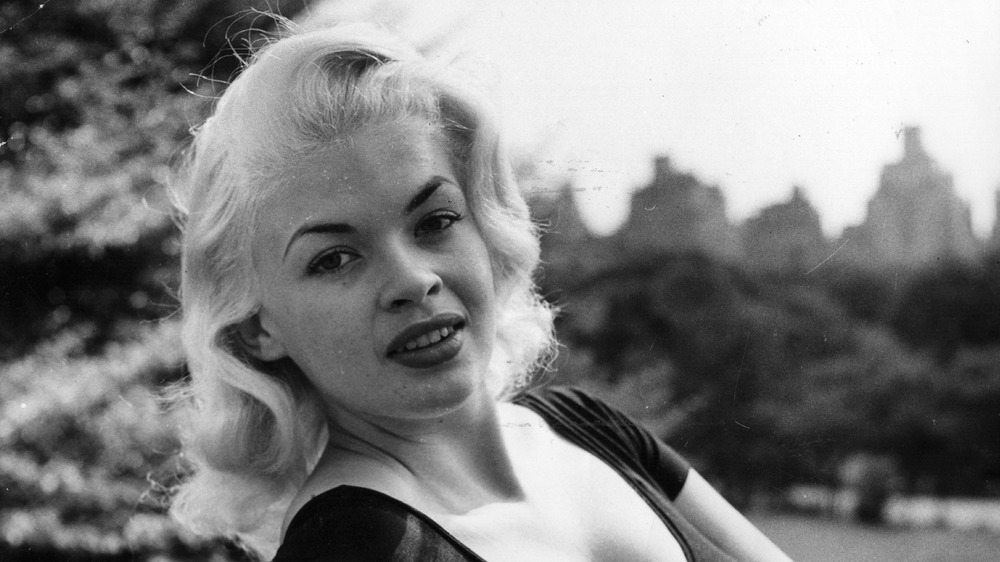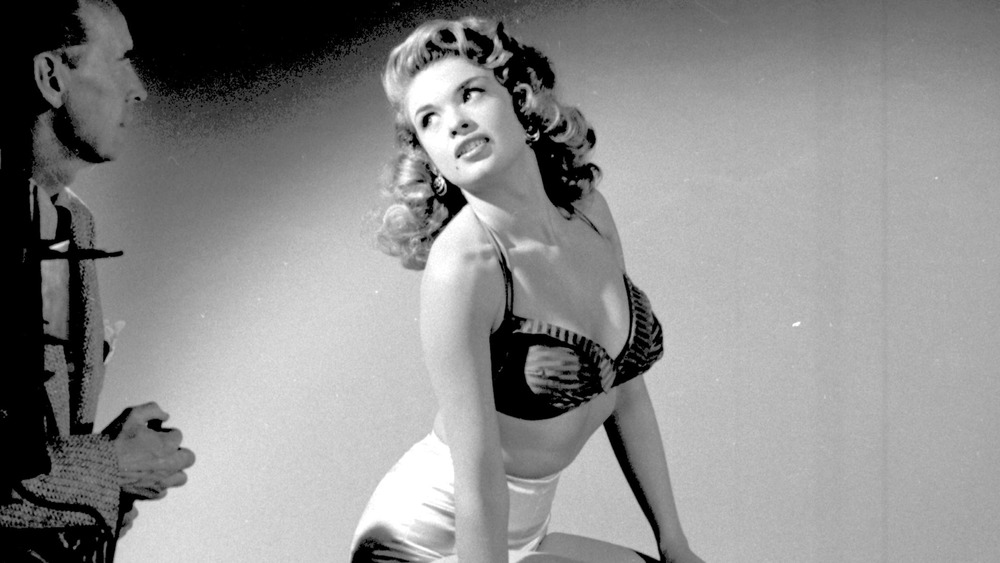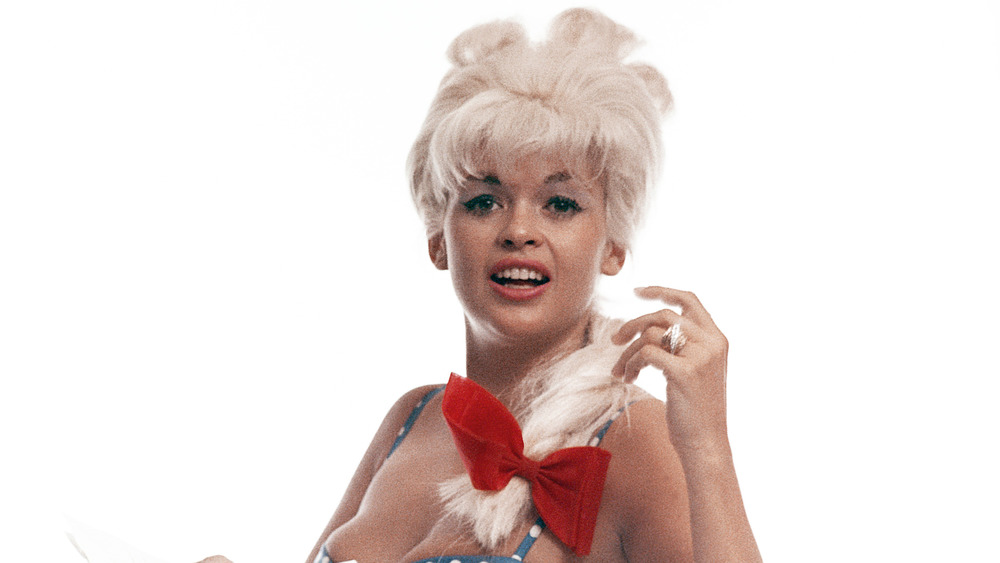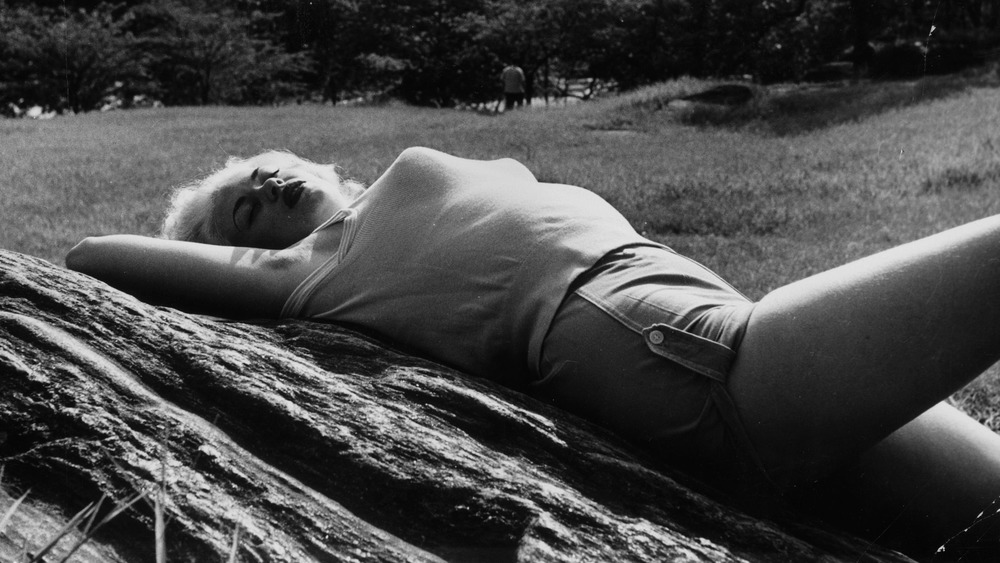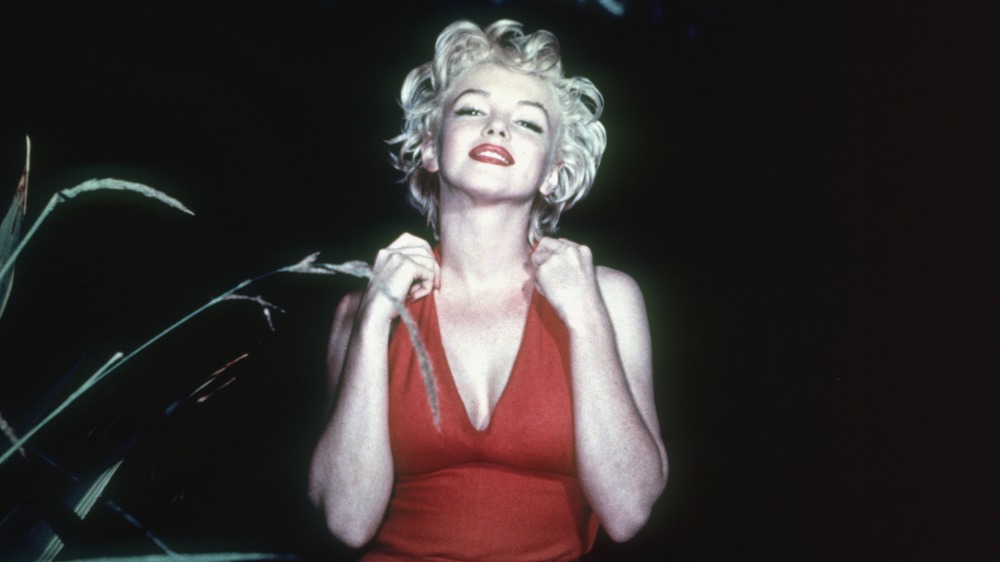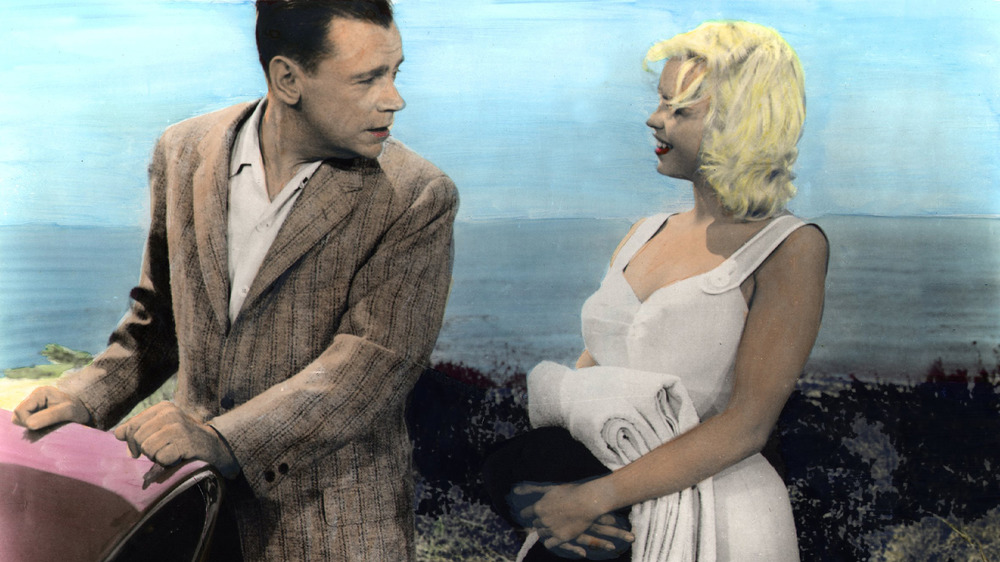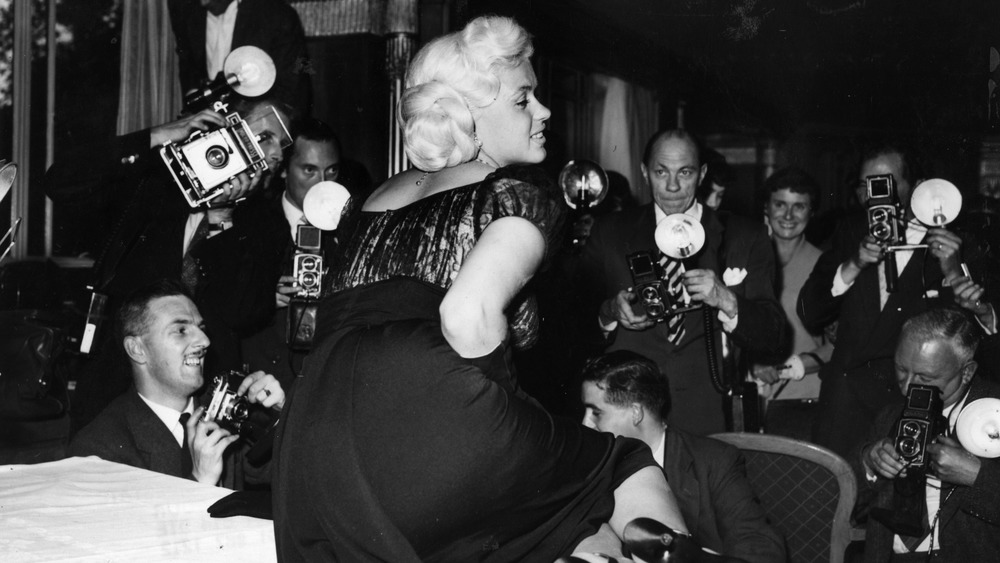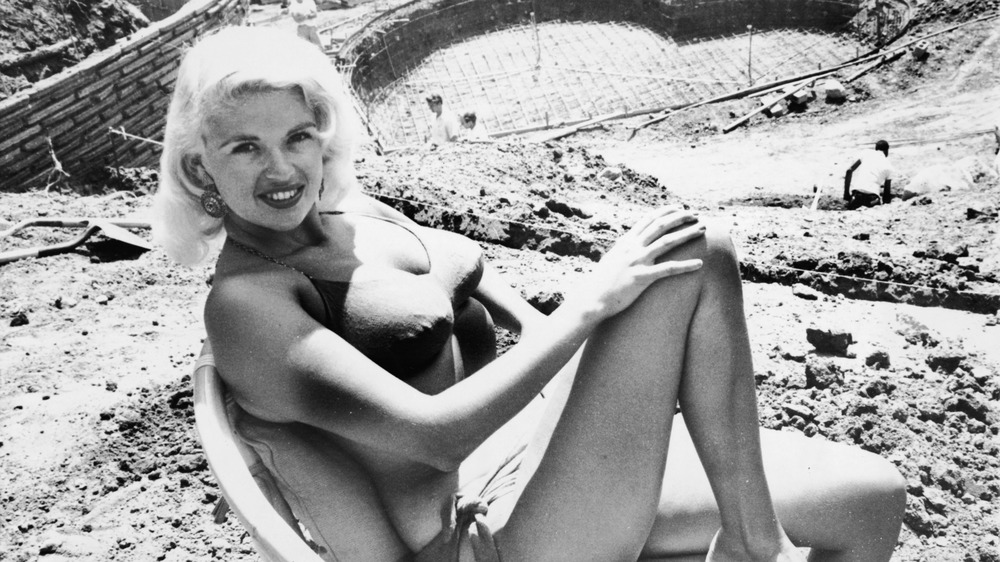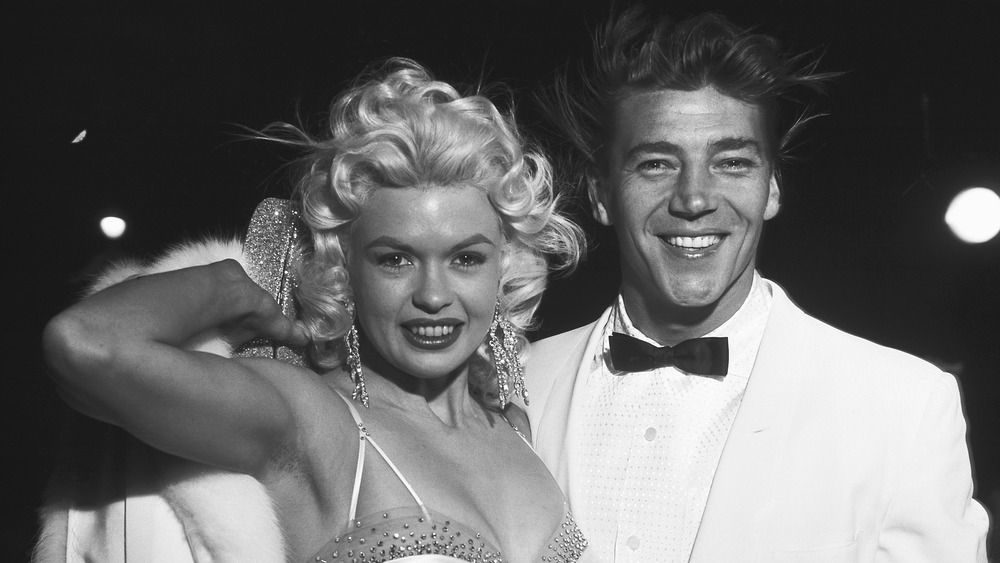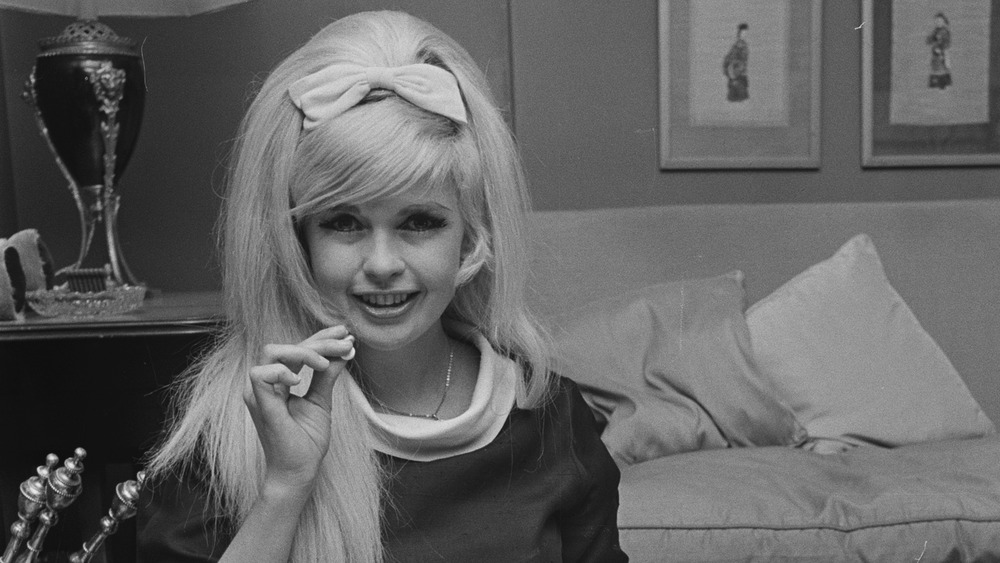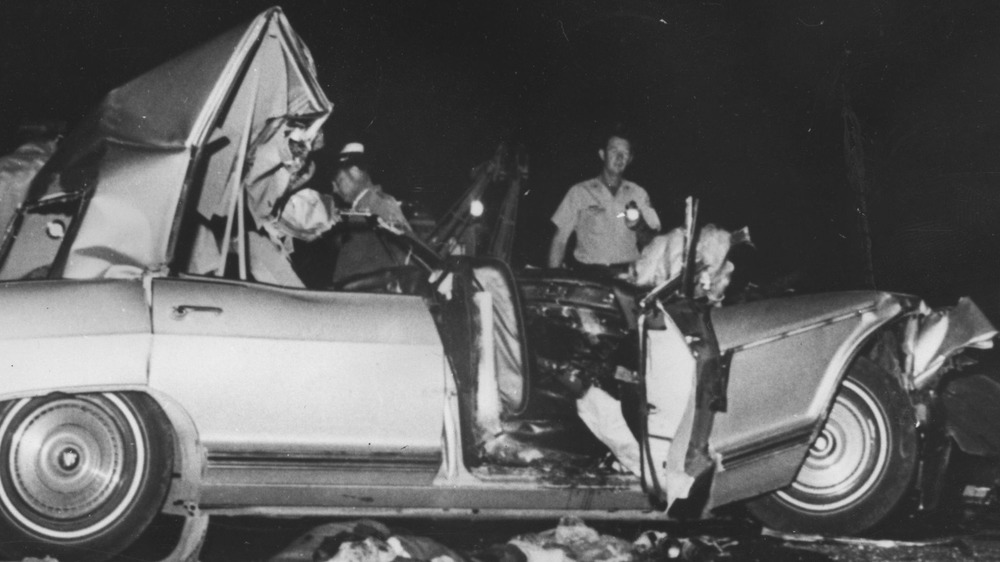The Tragic Real-Life Story Of Jayne Mansfield
There are celebrities whose talents and looks captivate the public for a while, and then there are stars, those rare entertainers with that intangible something that elevates them beyond mere fame to the lofty heights of legend. From an early age, Jayne Mansfield knew she was destined for stardom. Dominating the pop culture landscape of the 1950s as one of the original blonde bombshells, Mansfield captured the imaginations of millions with her stunning looks, gravity-defying figure, and effervescent personality.
Mansfield rode a wave of publicity hyping her as heiress apparent to Marilyn Monroe. Yet, as Monroe yearned for privacy, Mansfield craved the limelight. Anything but a dumb blonde, Mansfield was in on the joke and only too eager to be the punchline. Sadly, she would come to be regarded by the public as a living caricature of Monroe — a role she both embraced and despised.
A talented dramatic actress and a skilled comedienne, Mansfield's legendary physical attributes and penchant for publicity stunts came to overshadow her abilities. As the 1960s dawned, the physical ideal of the voluptuous blonde fell out of style, and Mansfield the movie star became a traveling nightclub act. Alcoholism and a toxic relationship marked a slow decline for the actress who had been one of the most photographed women of the 1950s. In 1967, Jayne Mansfield's wild ride to fame and fortune came to a heartbreaking end on a dark stretch of highway outside of New Orleans. This is the tragic real-life story of Jayne Mansfield.
Jayne Mansfield was a married mother at 17
Born Vera Jayne Palmer in 1933 in Bryn Mawr, Pennsylvania, to parents Herbert William and Vera Jeffrey Palmer, Jayne Mansfield always knew she wanted to be famous. Teenage Jayne plastered her walls with photos of movie idols and dreamed of stardom. In 1936, a big part of Jayne's world came crashing down when her beloved father died suddenly of a heart attack. Herbert Palmer's passing left a void in Jayne's life. "She grew up always looking for a father and looking to men for a father image [...] and she never found it," Raymond Strait, author of The Tragic Secret Life of Jayne Mansfield, told Biography.
At 16, Vera Jayne Palmer, not yet out of high school, eloped with 20-year-old Paul Mansfield. Jayne kept the marriage under wraps and continued to attend high school and live with her mother and stepfather. However, when Jayne became pregnant, the secret came out. "Momma said I had ruined my life and her life," Jayne told her friend and biographer May Mann. "Momma said I made my bed and I would have to lie in it, and to expect no help from her. [...] Then she relented and bought me a pretty white wedding dress and we had a wedding of sorts. But I always remembered her telling me never to expect help from her."
On November 9, 1950, Jayne and Paul Mansfield welcomed daughter Jayne Marie into the world. However, motherhood would do nothing to diminish Jayne's ambition.
Mansfield's pursuit of stardom took a toll on her marriage
After Jayne's high school graduation, the young couple enrolled at Southern Methodist University in Dallas. Like many young newlyweds, Jayne and Paul Mansfield struggled financially. Nevertheless, they juggled parenthood, classes, and work to make a life for themselves and their baby daughter. "Paul and I had a rough time," Jayne told May Mann. "I peddled photo albums door-to-door, and he took odd jobs, swept floors, and sold magazines. [...] Many times, I would have to take Jayne Marie [...] to classes with me."
With her husband away for ROTC summer camp, Jayne left their daughter in the care of her parents while she headed for California to study drama at the University of California, Los Angeles. At the end of the summer session, the Mansfields briefly returned to Texas, but the Korean War necessitated Paul's activation in the Army Reserve and a move to Camp Gordon near Atlanta, Georgia. Jayne's habit of sunbathing and outdoor exercise caused quite a stir among the soldiers and their wives and drove her husband mad with jealousy.
Paul Mansfield struck a deal with his wife. If she could wait out his two-year tour of duty, they would move to Hollywood and make a go of Jayne's dreams. Initially on board with Jayne's aspirations, Paul Mansfield moved his small family to Los Angeles. Soon, however, Paul would come to hate the idea of Jayne becoming a star as her pursuit of her career pushed him further and further into the background of his wife's life.
Jayne Mansfield was too hot for advertising
Incredibly intelligent and possessing superhuman ambition, Jayne Mansfield mapped her every career move like a general planning an assault. By the 1950s, the public's conception of ideal womanhood was the voluptuous platinum blonde. Marilyn Monroe set the standard for the mid-century sex symbol, and thousands of would-be starlets followed her lead. With her 40-22-35 figure, mother nature had given Jayne Mansfield a leg up — a bottle of peroxide would do the rest.
Jayne Mansfield took the concept of the blonde bombshell and turned it up to 11, but even in an era when bigger was always better, her curves proved a bit too dangerous to some. As recounted in a 2003 episode of the BBC documentary series Living Famously, Mansfield's stunning looks had scored her numerous titles, ranging from Miss Photoflash and Miss Cadillac to Cherry Blossom Queen and Queen of the Palm Springs Desert Rodeo. (The only title she ever turned down was Miss Roquefort Cheese because "it didn't sound right.") Yet, her physical assets were just a bit too hot for commercial advertising.
The official Jayne Mansfield licensing website, JayneMansfield.com, quotes photographer Gary Lester on one of Mansfield's first professional modeling gigs, a photo shoot for General Electric. "Jayne was one of the girls I used. She was way over to the left side of the picture," Lester recalled. "General Electric notified me that they had to cut her out of the picture because she looked too sexy for 1954 viewers."
Mansfield's first husband accused her of being an unfit mother
Jayne Mansfield's first marriage would not survive her quest for stardom. Just four months after arriving in California, Jayne and Paul Mansfield separated. Cracks in their marriage had begun to show during their time at Camp Gordon. According to biographer Raymond Strait, Paul Mansfield had hoped that marriage and motherhood would quell his wife's ambitions. By the time Paul left for Korea, the marriage was effectively over, but propriety kept Jayne from filing for divorce. "I knew it," Mansfield said, "and I think Paul did, too, but you don't walk out on your husband while he's off fighting a war. At least I don't."
The marriage collapsed under the strain of emotional and financial struggles brought on by the Mansfields' move to California and Jayne's single-minded pursuit of fame. Alleged infidelities on Jayne's part also took a toll on Paul. Eventually, he gave Jayne an ultimatum: It was him or her career. Soon, he was on his way back to Dallas.
Jayne Mansfield's ambitions finally began to bear fruit when she landed her first movie role in the 1955 film noir Female Jungle. That year would also find Mansfield making the first of many appearances in Playboy. Jayne's semi-nude photo spread in the famous men's magazine gave Paul Mansfield what he hoped would be ammunition to gain custody of their daughter, citing it as evidence that Jayne was an unfit mother – a claim repeated by each of her subsequent husbands and never proven in a court of law.
Jayne Mansfield's first film contract was a bust
Jayne Mansfield instinctively understood the value of publicity. She turned to Jim Byron, a former club promoter, to help her with her image. As related in Jayne Mansfield: A Biography, Byron managed to get her a meeting with a producer at Warner Brothers. Already familiar with Mansfield's story from thousands of other starry-eyed, aspiring actresses, the producer told her she'd be better off settling down as a wife and mother. After taking Mansfield on a tour of the studio lot, the producer told her he'd call her if something came up. Soon after, the studio called Mansfield for a screen test. Within days, she signed a seven-year contract with the studio.
At first, it seemed that Jayne Mansfield had at last achieved her dreams of stardom. She relished strolling about the Warner lot in the company of the biggest movie celebrities of the day, and Warner's publicity machine kept her in the public eye. Yet, her seven-year contract resulted in little work for Mansfield. Ultimately, Warner Brothers dropped Jayne Mansfield after four largely unremarkable films.
In July 1955, Mansfield took a starring role in George Axelrod's play Will Success Spoil Rock Hunter? A Broadway smash, the play finally propelled Mansfield to fame. However, 20th Century Fox was so eager to nab the actress that the studio bought the rights to the play and signed Mansfield to a new six-year contract with a promise to groom her as one of the studio's most important stars.
Jayne Mansfield lived in Marilyn Monroe's shadow
From the beginning of her career to the present day, many critics dismiss Jayne Mansfield as an overblown parody of Marilyn Monroe. The comparisons began with Mansfield's star-making turn in George Axelrod's 1955 comedy Will Success Spoil Rock Hunter? In the play, Mansfield stars as Rita Marlowe, a stereotypical blonde starlet with a breathy voice and a questionable IQ. Written as a lampoon of Monroe, Rita Marlowe gave Mansfield the opportunity to stretch out in a comedic role. Unfortunately, she would forever be branded as a "dumb blonde" by detractors who mistook her act for reality. Mansfield, who had an IQ in the 140s (and reported as high as 163 by some sources), spoke five languages, and played violin, piano, and viola, shrewdly crafted her flighty, sex bomb persona for maximum impact.
Where Monroe came to despise her public image and longed to be considered a serious actress, Mansfield craved attention. So, when the recalcitrant Monroe was suspended by 20th Century Fox, the studio picked up Jayne Mansfield to fill the shoes of their troubled and increasingly disagreeable star. "[Jayne Mansfiled] loved being Marilyn whereas Marilyn hated being Marilyn," playwright George Axelrod told Biography. "That was the difference between them."
Citing Monroe's pretensions to art, Mansfield explained her own unique appeal to The Washington Post's Lawrence J. Quirk in a 1957 interview. "I want to strike out on the common trail; I want to be the ordinary man's conception of what a sexy, obliging, comradely, down-to-earth girlfriend ought to be."
Jayne Mansfield's career peak and sudden nosedive
Jayne Mansfield's move from Broadway to 20th Century Fox at last put her on the road to movie stardom. Her first film at the studio was a technicolor rock 'n' roll comedy titled The Girl Can't Help It. In the film, Mansfield stars as Jerri Jordan, the tone-deaf girlfriend of a mobster determined to make her a singing star with the help of a hapless, hard-drinking press agent. The film, featuring performances by Eddie Cochran, Gene Vincent, Fats Domino, and Little Richard, was a huge success and further cemented Mansfield's sexpot image.
Mansfield's next film for Fox was a radical departure. Released in 1957, The Wayward Bus, based on a novel by John Steinbeck, found the actress in a rare dramatic role. A modest box office success, the film garnered Mansfield a Golden Globe for New Star of the Year. The same year, Mansfield would star in Kiss Them For Me with Cary Grant and reprise her role as Rita Marlowe in the film adaption of Will Success Spoil Rock Hunter?
A world-famous movie star at last, Mansfield bought a Hollywood mansion, a Jaguar, and host of other luxuries all in her signature color, pink. Mansfield's meteoric rise ended with the 1958 release of The Sheriff of Fractured Jaw. As the 1960s dawned, the era of the blonde bombshell was over. Relegated to low-budget foreign "B" pictures, Mansfield was forced to turn down roles due to her repeated pregnancies. In 1962, Fox ended her contract.
Publicity stunts marred Jayne Mansfield's image
Despite her many film and television appearances, Jayne Mansfield will forever be remembered simply for being Jayne Mansfield. Rather than gaining notoriety for a signature role, Mansfield's stardom stemmed from her ability to promote herself. Mansfield's lust for the spotlight made her a progenitor of the modern reality star. No part of her life was off limits, and there truly was no such thing as bad publicity for Jayne Mansfield. "She really was the first star to create the idea that the public needed to know who you are — not just the public persona, but behind closed doors," P. David Ebersole, director of the documentary Mansfield 66/67, told The Hollywood Reporter in a 2017 feature about the late actress.
Decades before Janet Jackson's infamous 2004 Super Bowl halftime performance, Jayne Mansfield pioneered the wardrobe malfunction when she "accidentally" lost the top of her skimpy red bikini after diving into a pool at a 1955 press junket. Her most famous photo-op, however, came at a 1957 party meant to officially welcome Italian actress Sophia Loren to Hollywood. In 2014, Loren told Entertainment Weekly about the night she was upstaged by Mansfield's plunging neckline. "I'm so frightened that everything in her dress is going to blow — BOOM! — and spill all over the table," Loren said.
Ultimately, Jayne Mansfield became a victim of overexposure. The press grew tired of Mansfield's antics and turned on the actress, as did 20th Century Fox. Weary of Mansfield's attention-seeking, the studio loaned her out for low-budget foreign productions.
Jayne Mansfield turned down the role of a lifetime
In 1964, Jayne Mansfield joined the touring company of a revival of the 1955 William Inge play Bus Stop. Marilyn Monroe starred in the successful 1956 film adaptation of Bus Stop, so once again, Jayne found herself traveling the late actress' footsteps. Joining Mansfield in the production was her second husband, Hungarian bodybuilder and former Mr. Universe Mickey Hargitay. Married in 1958, the bigger-than-life couple had two children and were expecting their third when they separated in 1963. By autumn of 1964, the couple had divorced but kept it mostly out of the press.
While touring Bus Stop, Mansfield and director Matt Cimber began a romantic relationship. The two wed one month after Mansfield and Hargitay's divorce was finalized. According to MeTV, Cimber gave Mansfield what proved to be a disastrous piece of career advice. At Cimber's urging, she turned down the role of movie star Ginger Grant on Sherwood Schwartz's classic sitcom Gilligan's Island. The role went to Tina Louise, who had appeared with Mansfield in the Broadway cast of Will Success Spoil Rock Hunter?
Jayne Mansfield's tumultuous love life
Jayne Mansfield pursued romance with nearly the same passion and intensity as she chased fame. Stardom and fame were a volatile mix for Mansfield. Her first marriage to Paul Mansfield, father of her daughter Jayne Marie and the man from whom she took her last name, withered in the light of her rising star. Paul's jealousy and reluctance to live his life as "Mr. Jayne Mansfield" coupled with his wife's rumored extramarital dalliances (one of which, according to her former press secretary and biographer Raymond Strait, was with an unnamed famous TV show host) ended their marriage in an acrimonious divorce and custody fight.
If Jayne Mansfield had one true love in life other than fame, it was bodybuilder Mickey Hargitay, whom she wooed away from an aging Mae West to marry in 1958. With their flashy style and physical perfection, they perfectly complemented one another. Nevertheless, Jayne embarked on a series of affairs, including an alleged tryst with President John F. Kennedy that eventually ended her second marriage. Mansfield's third and final marriage to director Matt Cimber ended in divorce in just under two years.
Substance abuse and a toxic love affair
Jayne Mansfield's final years were stained with tragedy and a struggle to remain relevant. Abandoned by the mainstream film industry, the few movie roles she could get were schlocky, exploitation fare. In 1964, Mansfield married theater director Matt Cimber, who assured her that he could reignite her Hollywood career. The two-year union resulted in another child and Mansfield's final starring role in Cimber's film Single Room Furnished.
If Jayne Mansfield had begun her career as a parody of Marilyn Monroe, it seemed that she was ending it as a parody of herself. Turning to drugs and alcohol to cope with a life and career that was rapidly careening out of control, Mansfield engaged in a volatile affair with her attorney, Sam Brody. Brody and Mansfield's relationship often degenerated into drunken brawls, as recounted by biographer May Mann. Diminished to performing a tawdry, traveling nightclub act, Mansfield's career and life were on borrowed time.
A tragic auto accident took Jayne Mansfield's life
On the morning of July 29, 1967, Jayne Mansfield, Sam Brody, driver Ronnie Harrison, and three of Mansfield's children were en route from Biloxi, Mississippi, to New Orleans, according to History. Mansfield was scheduled for an appearance on local TV.
At around 2:00 AM, the party's car collided with the rear of a tractor-trailer. Shrouded in a fog of pesticide, the looming danger was virtually invisible. The three adult occupants were killed instantly, though the children survived. Jayne Mansfield was just 34 years old.
From allegations of a curse placed on Brody by Mansfield's alleged paramour Anton LaVey, founder of the Church of Satan, to the persistent but false rumor that the actress was decapitated, the accident continues to fascinate Mansfield's devotees. The mangled car in which the actress lost her life became a lurid, traveling attraction. It is now in possession of Scott Michaels, founder of Dearly Departed Tours in Los Angeles.
